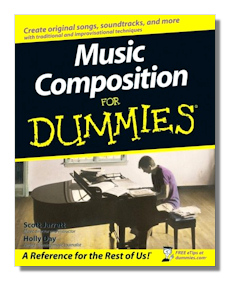
The Internet's Premier Classical Music Source
Related Links
-
Introduction
Acoustics
Ballet
Biographies
Chamber Music
Composers & Composition
Conducting
Criticism & Commentary
Discographies & CD Guides
Fiction
History
Humor
Illustrations & Photos
Instrumental
Lieder
Music Appreciation
Music Education
Music Industry
Music and the Mind
Opera
Orchestration
Reference Works
Scores
Thematic Indices
Theory & Analysis
Vocal Technique
Search Amazon
Recommended Links
Site News
 Book Review
Book Review
Music Composition for Dummies

Scott Jarrett & Holly Day
Hoboken, NJ: Wiley Publishing, Inc. 2008.
ISBN-10: 0470224215
ISBN-13: 9780470224212
Summary for the Busy Executive: So you wanna be a composer?
I suspect that many classical-music listeners besides me fantasize about composing mighty symphonies, concerti, and cantatas themselves. For most of us, however, it remains a fantasy. The sheer amount of technical information (the lowest note of the bassoon, for example) and the dog-work skills like simple voice-leading and species counterpoint usually suffice to daunt and dash our daydreams.
So the book title intrigued me. I could understand a title like Ebay for Dummies or Databases for Dummies, but this one seemed as far-fetched as Civil Engineering for Dummies. Would you really want to drive on a bridge built by a reader who learned exclusively from that book? Still, the title tells me I'm obviously the target audience for this book, so checking it out of the Public Library, I gave it a try.
Obviously, once you've gone through its training, you're not going to be writing anything nearly as good as Beethoven's Missa Solemnis, unless, of course, you're already nearly as good as Beethoven. As Schoenberg once said, "Of course, a soul you have to have." In that sense, the book's a bit of a cheat. Nevertheless, it does possess certain virtues.
The book combines a little bit of first-year theory, some music appreciation, a couple of classes in counterpoint, and a whole lot of hand-waving – that is, skipping over the actual hard work involved with actually putting decent notes on paper. In the chapter on composing for the standard orchestra, you learn what a transposing instrument is and the range of several instruments, but not about the break in the French horn or what are reasonable and effective combinations of instruments. For those, you probably need to study scores of pieces whose orchestration you like. Nevertheless, would it kill you to learn what the range of a horn in B-flat is or how to make sense of a part written for it?
However, all this aside, I really don't know whom this book serves. You could probably do better – at least acquire a more thorough knowledge – from a first-year harmony textbook or a counterpoint workbook. You'd do better with studying scores of real music and with listening to a wide range of music, to know what's possible. Composition doesn't reduce to a set of rules. One needs guidance, of course, and rote knowledge and hard practice, as well as talent. So I'd give this a miss.
Copyright © 2008 by Steve Schwartz.


















